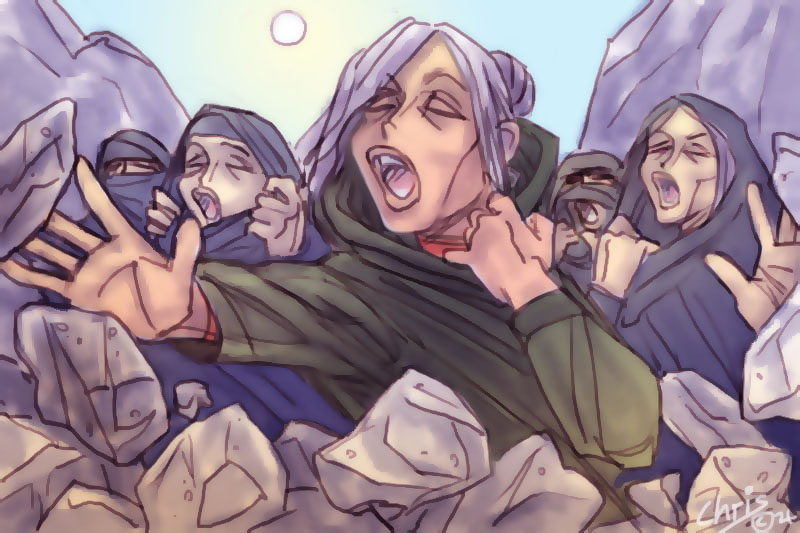How do you try to turn a human into something less than what a human is? You take away their voice. Introducing, again, the Taliban in Afghanistan. The subversion of what is innately a part of what it means to be human has been directed at half the population, that is, women.

Recently, new laws came into force, approved by supreme leader Hibatullah Akhundzada, banning women’s voices and faces in public. The ministry for ‘virtue and anti-vice’, set up after the Taliban regained control of Afghanistan in 2021, revealed its latest edicts in a wide-ranging hammering of the rights practically everyone in the world takes for granted.
A ministry spokesman, Maulvi Abdul Ghafa Farooq, said: ‘Inshallah we assure you that this Islamic law will be of great help in the promotion of virtue and the elimination of vice.’
To achieve this aim, a woman, in essence, must deny herself to the world. She must veil her body in public, with her face covered. Her clothing must be formless in that anything that shows contour is banned. This will prevent corruption. The voice of a woman should not be heard in public, if it be to sing, recite or read. They must also not look at men they do not know.
‘Whenever an adult woman leaves her home out of necessity, she is obliged to conceal her voice, face, and body,’ say the new laws. To a lesser extent, men need to cover their bodies from the bellybutton to the knees if they leave the house.
Afghan human rights activist Fawzia Koofi, is reported to have said, ‘The Taliban government does not have any sort of legitimacy and these new edicts designed to further erase and suppress woman are an indication of their hatred towards women.’
This method of attaining virtue, or rather this enslavement to attain virtue, is in extremis writ large, in that non-adherence to it results in punishment. It follows a March edict from the supreme leader that the government is reintroducing the public flogging and stoning of women for adultery.
‘We will flog the women … we will stone them to death in public [for adultery],’ Akhundzada said.
Stoning women? And if they die from rocks being thrown at them and crushing their heads in, so be it. Perhaps the men of the Taliban should be rid of all women, it would save them a lot of effort. Oh wait, if they were no women, there would be no men.
This abhorrent practice would seem to anyone of sound mind to go against the five pillars of Islam, which the Taliban say all must adhere to. That is reciting the faith, ritual prayer five times a day, alms for the needy, fasting during Ramadan and pilgrimage to Mecca.
The subjugation of women by extreme violence is not a pillar of faith. But there is hope blossoming in courageous defiance of the new laws. Videos have recently emerged online of Afghan women singing.
These are truly freedom songs, protest’s mantra. In the women’s voices, they are, in effect, shouting, we will not be cowed. You cannot take away from us our voice, our heart and soul. It is courage beyond what protest means on city streets in the West. This is a matter of life and death.
And when music is banned, because it is deemed of corruptible potential, then it says more about the hollowness at the centre of the regime and the enforcers. That they prefer, nay require, the only sounds to be those of government boots on innocent faces, then surely, their days are numbered. Music, and poetry, have no frontiers. Sadly, despairingly, there are victims along the way.
When the Taliban returned in 2021, folksinger Fawad Andarabi’s fate was sealed. He was murdered by them. A bullet to the head, his son Jawad said. ‘He was innocent, a singer who only was entertaining people.’
A Taliban spokesman said at the time, ‘Music is forbidden in Islam, but we’re hoping that we can persuade people not to do such things, instead of pressuring them.’
Some persuasion.
The Taliban, of course, aren’t the first to fear the singer. Chilean songwriter Victor Jara was murdered in 1973 during the days of Augusto Pinochet. In less extreme examples, music has been censored by governments. The Nazis, notably, took a dim view of jazz, banning its broadcast on radio.
The United Nations, in its usual withering manner, condemned the latest edicts. It said a climate of fear and intimidation was gathering strength in the country.
Here is a simple equation: when half a country is silenced, when women are forced into subservience, silence, and stoned into submission, then surely the whole world should act. It is the human thing to do.
Warwick McFadyen is an award-winning journalist. He has won two Walkley Awards and four Quill Awards. He has published several books of poetry. The latest is 21+4 Poems. His prose and poems have also appeared in Quadrant, Overland and Dissent.
Main image: Chris Johnston illustration.